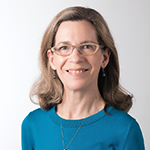
Lindsey A. Criswell, MD, MPH, DSc
In early 2021, Lindsey A. Criswell, MD, MPH, DSc, one of rheumatology’s preeminent autoimmune genetics researchers, will become the new director of the National Institute of Arthritis and Musculoskeletal and Skin Diseases. She will be the first woman to hold that post. Dr. Criswell will be leaving her current position as vice chancellor of research at the University of California, San Francisco (UCSF), where she is also a professor of medicine in the Department of Medicine, professor of orofacial sciences in the School of Dentistry, and the former director of the Division of Rheumatology.
Dr. Criswell has led multiple NIH grants as principal investigator and has published more than 250 peer-reviewed journal papers. Her work has contributed to the understanding of the genetics and epidemiology of autoimmune disease, especially rheumatoid arthritis and systemic lupus erythematosus.
‘Nature vs. Nurture’
Throughout her career, Dr. Criswell has been indefatigable in forging a unique research path. Although she trained with, and was exposed to, many influential physicians and researchers, “I never had a mentor who was doing exactly what I wanted to do,” she says. Her career path reflects her inquisitiveness about the epidemiology of disease processes and a willingness to explore intersectional possibilities with different disciplines and create productive collaborations.
Dr. Criswell recalls that her interest in science began early, with a fascination with the natural world. As she moved into high school, the pull toward math and the sciences remained strong. By the time she entered college at the University of California, Berkeley, “I knew I was going to major in something related to science,” she says. She gravitated to research, bolstered by undergraduate research opportunities at the Cold Spring Harbor Laboratory on Long Island, and study in biophysics in the Cyclotron Building at UC Berkeley’s Lawrence Berkeley Laboratory.
She discovered, in her initial science courses at Berkeley, that genetics offered the best example of a scientific field that incorporated mathematics, and specifically statistics. And, she adds, “What really sealed the deal for me was another long-standing fascination I had with the concept of nature versus nurture.” She earned her BS in genetics—“that was my scientific home.”
Keeping Options Open
As Dr. Criswell began to consider her ultimate career direction, she realized that a purely research track might not offer all the possibilities she was seeking. “I decided to apply to medical school largely to keep my options open,” she explained. She acquired her MD at UCSF in 1986, again opting for the broad scope—internal medicine—to keep her options open. During training, she says, she fell in love with the rheumatic diseases, especially scleroderma and dermatomyositis. Clearly, she recalls, “there was such a great need to understand these diseases better.” Rheumatology, then, became her medical home.


